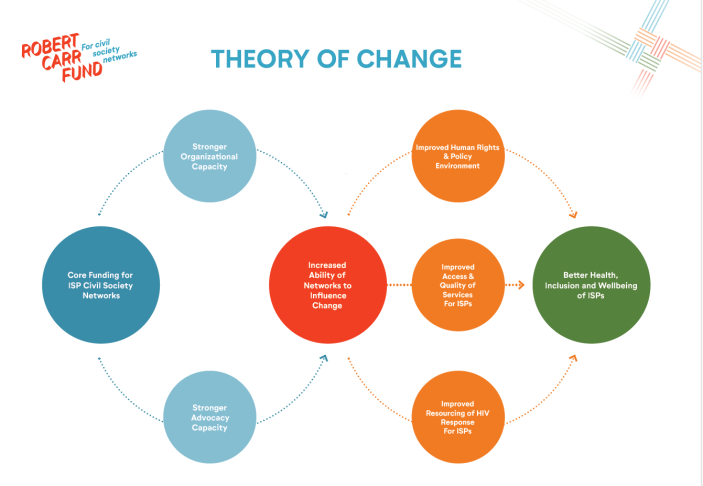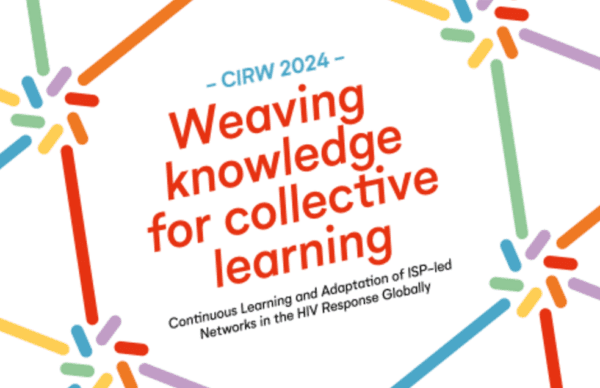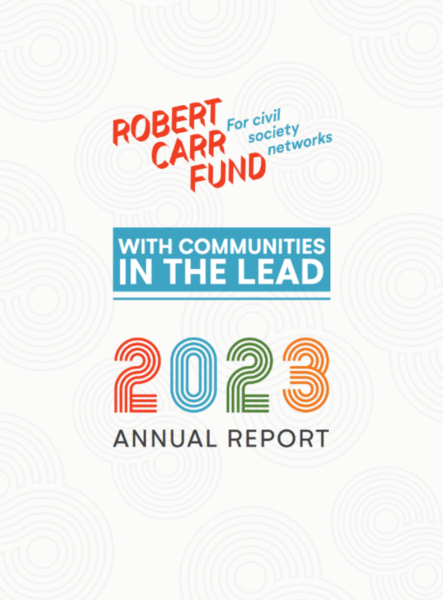RCF Theory of Change and MEL Framework
In 2023, The Robert Carr Fund revised its Results Framework to streamline reporting for our cohort of grantees, creating a framework with fewer and more intuitive indicators.
The revised Results Framework, together with RCF’s Theory of Change, represent RCF’s MEL approach, which guide how the RCF sees change within its context, and how we measure this change.
RCF Theory of Change
RCF’s Theory of Change illustrates how investing in community leadership creates lasting impact in the health, inclusion, and wellbeing of Inadequately Served Populations(ISPs) globally.
Central to RCF’s mission is a fundamental truth: communities know best what they and their movements need.

RCF’s strategy: RCF provides long-term, flexible core funding to civil society networks that are led by and emerge directly from the ISP communities they serve. By placing decision-making power in the hands of communities themselves, this funding enables networks to determine their priorities and invest in their identified needs based on their community knowledge and lived experience.
Short-term Outcomes
When communities control resources, networks are able to strengthen their organizational foundations and enhance their advocacy capabilities according to their own vision.
Intermediate Outcomes
This community-determined strengthening allows networks to exercise greater influence in the policies and decisions that affect their lives.
Long-term Outcomes
As networks amplify community voices and expand their influence, they achieve concrete improvements: Stronger human rights protections through community-informed policies, Expanded access to more adequate HIV and SRHR services based on real community needs Increased and more transparent responsive resource allocation for HIV response.
RCF’s Theory of Change maps how communities transform potential into power. When grassroots groups control their resources, they influence lasting improvements in health, rights, and wellbeing for ISPs globally.
This reflects a simple truth: real change takes root when communities have both the funding and the freedom to bring their own vision to life.
RCF 2024 ToC and MEL Framework
RCF MEL Framework
The Robert Carr Fund (RCF) employs a consistently evolving approach to measuring impact through its Monitoring, Evaluation for Learning (MEL) Framework. This combines systematic data collection with dynamic learning processes, recognizing that meaningful change emerges from continuous reflection and adaptation.
RCF measures progress across four critical outcome areas that together create positive change for inadequately served populations (ISPs).
Capacity Strengthening (all RCF partner networks work on this outcome area)
Outcome Area 1: Network Strength and Influence, examines how organizations build their capacity to influence change.
Programmatic (Advocacy) Outcomes (RCF partner networks select and report on whichever area/s their work will focus on each year)
Outcome Area 2: Human Rights, tracks influenced improvements in policies and protections.
Outcome Area 3: Access to and Quality of Services, measuring influenced actions that have improved community access to and quality of HIV and SRHR-related services.
Outcome Area 4: Resource Accountability, monitoring how funding and resources for HIV response are allocated and used effectively.
At its foundation, RCF’s measurement approach begins with baseline assessments that capture each network’s starting point at the launch of RCF’s 3-year grant cycle. From there, the framework tracks progress in these outcome areas through both quantitative indicators and qualitative assessment.
What makes RCF’s approach distinct is its learning cycle. Networks engage in regular reflection, examining their experiences to understand what works, what needs adjustment, and how to build on successes. This reflection happens at two levels: individual networks conduct ongoing assessments throughout the year, while the full RCF collective comes together annually to share insights and strengthen collective impact.
Data collection occurs through the means of an annual survey – each network contributes not just numeric data, but also qualitative data that reflect their findings, processes, results and learnings across that year. The submitted stories and metrics are then combined to develop RCF’s annual report each year. At the end of the 3-year cycle, a concluding report is generated, that reflects RCF’s Results Framework and cohort results across the 3-year grant cycle.
RCF’s three-year grant cycle allows time for networks to develop, implement, and refine their strategies. It is imperative to note that most RCF funded networks have been recurring partners since the fund’s inception in 2012. This long-term approach to partnerships recognizes that sustained community leadership, rather than quick fixes, creates lasting improvements in health, rights, and wellbeing for ISPs.
Through this balance of measurement and learning, RCF strives to build evidence for the effectiveness of community-led responses while helping networks demonstrate and amplify their impact across all four RCF outcome areas.
RCF 2024 ToC and MEL Framework
RCF Annual Reports:
RCF Annual Report 2023
RCF Annual Report 2022
RCF Annual Report 2021
Earlier RCF Annual Reports can be requested by sending an email to secretariat@robertcarrfund.org.
Read more about our definitions of in the Glossary.


